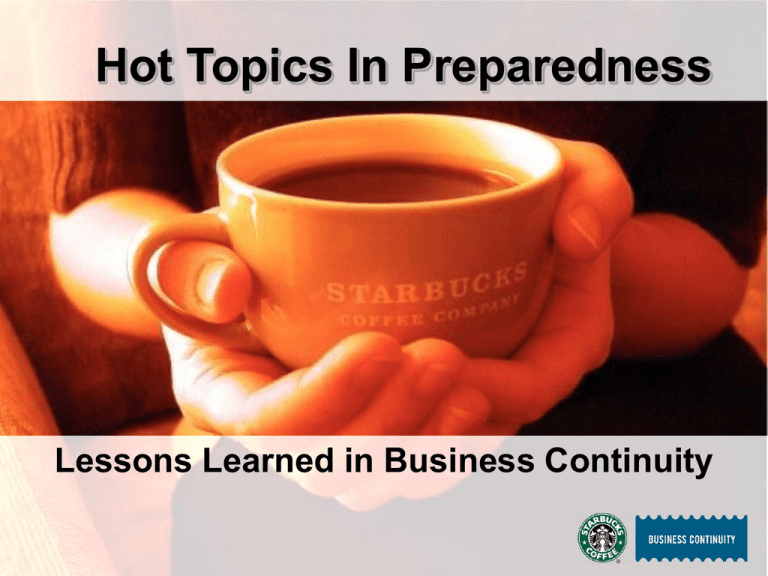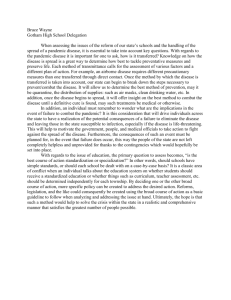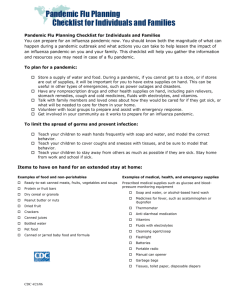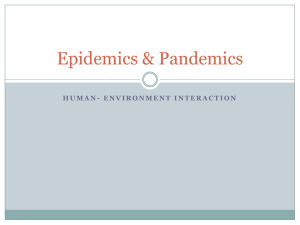Community Support Communication
advertisement

Hot Topics In Preparedness Lessons Learned in Business Continuity Starbucks Beginnings Starbucks Today United Kingdom Canada • Austria United States • Switzerland Mexico • Germany Puerto Rico • Austria • Spain Starbucks by the Numbers 12,142 locations world wide 128,197 partners (employees) Korea Continental Europe • Greece Peru • Cyprus • France Chile Middle East • • • • • • • • Bahrain Kuwait Lebanon Oman Qatar Saudi Arabia UAE Turkey Japan China Taiwan Thailand Philippines Malaysia Singapore Indonesia Australia New Zealand Poll Question 1 I estimate that the number of Starbucks stores in my jurisdiction is between: A. 0 - 5 B. 5 - 25 C. 26 - 100 D. Who knows? They open so fast that I can’t keep track. Example of Previous Events • Triple Homicide, 1997 Georgetown store Washington D.C. • WTO November, 1999 Seattle • Nisqually Earthquake February, 2001 Seattle September 11, 2001 Adding Value Impacts of Catastrophes on Shareholder Value By Rory Knight and Deborah Pretty Poll Question 2 It is important for public health leadership to interact with large and small businesses about their: A. Business recovery planning B. Emergency response to events C. Information technology recovery D. All of the above Starbucks Business Continuity Program Today Business Continuity leads the enterprise through business disruptions caused by incidents or disasters. The program protects our partners and customers, guards company assets, and preserves brand integrity by evaluating risks, developing ongoing strategies, and implementing and testing plans. Business Recovery Emergency Response Plan and implement procedures to restore Starbucks site operations at temporary locations and recover Internationalnormal operations. Develop, implement and test policies, procedures and actions to be followed in the event of an Operations Plan for the recovery of critical IT assets including, network, hardware, and data to meet RTO/RPO requirements. I.T. Disaster Recovery emergency. Training and Awareness Critical Incident Goals Goals – Protect partners – Contain the incident – Communicate to all stakeholders, including media – Assess the affects of the disaster correctly – Decide on and implement optimal response plans Tsunami, Patong Thailand Dec., 2004 Poll Question 3 My jurisdiction maintains a contact list (for emergency response) of: A. The largest employers B. Most small businesses C. Both A. and B. D. None of the above Hurricane Katrina—Lessons Learned Hurricane Response Protocol • Pre-storm preparation checklists (starting 5 days out) • Communications guidelines • Store closing preparations • Store reopening criteria • Media relations guidelines • Red Cross/government contact information Levee Breech and Impact Response Team Starbucks Support Team (Seattle) • Business Continuity • P&AP • Global Communications • Payroll • Total Pay • Facilities • Operations • Corporate Social Responsibility • Marketing • Retail Communications Regional Field Office (Atlanta) • Regional Vice President • Regional Director • District Managers (on-site in Louisiana/Texas • • • • Regional Partner Resources Regional Facilities Regional P&AP Regional Marketing Locating Partners Office building off I -10 Temporary Housing New Orleans, Sept. 2, 2005, Jocelyn Augustino/FEMA Pay and Benefits • All Pay and Benefits continued for all partners through September • A one-time CUP fund payout of $500 is granted to all displaced partners from the New Orleans • $25,000 in Am-x gift checks are sent to leadership to disburse to partners • EAP Meetings and counselors sent on site to Houston, Baton Rouge and Atlanta Communications Community Support/Marketing Poll Question 4 I was able to go to New Orleans within 30 days of the Katrina catastrophe. A. Yes B. No Partner & Asset Protection Facilities Canal Street Store, May 2006 Canal Street Store, Sept. 2005 The Last Partner… 2005 Hurricane Season—Lessons Learned • Communication: Know all out-of-state partner contacts in advance. Make all partners aware of multiple communication channels. • Clear Pay Expectations: Define how partners will be paid and for how long. Be consistent throughout the region and organization. • Direct Deposit: Increase participation in direct deposit so that partners are able to be paid during any incident • Distribution Expectations: Plan standing orders with vendors to be filled after the storm. • Community Outreach: Donate product to key community groups prior to storm impact. • Community Support Communication: Within 24 hours marketing to provide plan for local response to community and create ways for all internal partners everywhere to be able to help. Rebuilding New Orleans, 2006 Rebuilding New Orleans—Project Acorn Pandemic Planning Calls for a Paradigm Shift • Industries hit the hardest will include the health sector, service industries, transportation, travel, and businesses with time-sensitive supply chains. (CDC: Impact Of Pandemic Influenza report, 3/05) • There is a real possibility of a disproportionate response due to public fear as a result of media coverage. • A pandemic would not be a typical disaster. – Widespread impact – Not a physical disaster – Duration – Notice – Primary effect is on staffing CDC, 2005 Starbucks Pandemic Plan Goals • Ensure partners and their families security and safety. • Remain the Third Place for customers and the community. • Preserve the continuity of Starbucks essential business functions. • Minimize the economic losses while adhering to our guiding principles. Pandemic Planning Summit, Mar. 21, 2006, U.S. Dept. of Education Plan Development Process Complete In Progress Not Started Plan for impact on business 6 2 0 Plan for impact on partners & customers 4 1 1 Establish policies and procedures to be implemented during a pandemic 6 0 0 Allocate resources to protect customers and partners during a pandemic 2 1 0 Communicate to and educate your partners 5 2 0 Coordinate with external organizations and help your community 4 0 0 27 6 1 CDC Business Checklist Area Total Current Project Status: 91% complete Determining Our Pandemic Response • Monitor the influenza; it will be critical to staying ahead of the impacts. • Create a series of increasingly restrictive responses to the spread of the pandemic. • Use the WHO phases, and then base actions on whether a country is “affected” or “non-affected.” Applying Lessons Learned to the Future Example: Pandemic Influenza • Plan components where we apply previously developed tactics • Manage Plan • Global Communications Strategy • Communicable Disease Travel Policy • Work from Home Procedures • Partner Resources • Expatriate and Foreign Nationals • Function Workaround and Recovery Plans • Plan components where we must create entirely new tactics • Office Procedures • Store Procedures • Manufacturing Facilities Procedures • Logistics and Distribution Pandemic Planning—Global Rollout • Overview of Avian Flu and pandemic influenza • Risks and assumption • Roles and responsibilities • Market guidance document • Table-top simulation Petal, Mississippi, Bill Tarpening/USDA Questions?



